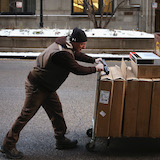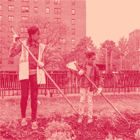
When Economists Took Socialism Seriously
If there’s one thing worth taking away from the White House report on socialism, it’s that economics is a political argument, not just a technical exercise.


If there’s one thing worth taking away from the White House report on socialism, it’s that economics is a political argument, not just a technical exercise.

Facing a deluge of doom-and-gloom reporting on the latest report from the Intergovernmental Panel on Climate Change (IPCC), Kate and Daniel get together to put things in perspective.

Carol Anderson discusses the numerous strategies Republicans are using to keep voters of color away from the polls, and how progressives can overcome them heading into the midterms and beyond.

Forget the avocado toast. Popular narratives about downwardly mobile millennials and their spending habits overlook a key factor in why young people have been hit so hard by today’s housing crisis: class.

The majority of Teamster members at UPS voted to reject a proposed contract; leadership says they’ll ratify it anyway. How did this happen? Nelson Lichtenstein joins us to discuss the ongoing conflict.

In her new book, economist Mariana Mazzucato explodes the myth that wealth is created solely by a select few trailblazing entrepreneurs, and lays out how our collective innovation can be put into the service of a more equal economy.

Calls for unions and activists to transform Wall Street from the inside have proliferated since 2008. But when progressives organize as shareholders, their good intentions inevitably run up against a fundamental obstacle: the bottom line.

The fascistic Jair Bolsonaro nearly scraped a first-round victory in Brazil, an ominous sign both for the left and for the country’s democracy. But the values he espouses go far beyond Brazil, and it is up to the left to devise new alternatives.

Jair Bolsonaro’s electorate—a loose coalition brought together by the candidate’s appeal to “bullets, bibles, and bulls”—stands perilously close to dragging Brazil back into authoritarianism.

If two recent analyses of populism agree on one thing, it’s that democracy and capitalism have fallen out of balance. Less clear is how—or whether—the truce between them should be restored.

Watch videos of all eight panels at our conference on the Future of the Left in the Americas, October 5–6 at the New School.

Touted by Republicans as a case study in reviving U.S. manufacturing, Foxconn’s new factory in Wisconsin only reveals the failings of the GOP agenda. To defeat Scott Walker in November, Democrats will have to show there’s a better way to create good jobs.

We look at two types of fights for workplace justice: the worker-owned cooperatives now mushrooming across the country, and a global protest at airports around the world.

Real-estate interests have long wielded an outsized influence over national housing policy—to the detriment of African Americans.

A decade after the crash of 2008, a growing movement has thrust our prolonged housing crisis to the center of the national agenda. Could this generation finally make the right to housing a reality?
Introducing the special section of our Fall issue.